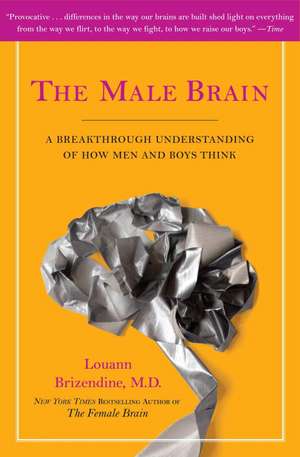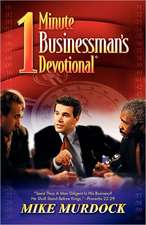The Male Brain
Autor Louann Brizendineen Limba Engleză Paperback – 2011
| Toate formatele și edițiile | Preț | Express |
|---|---|---|
| Paperback (2) | 58.00 lei 24-30 zile | +20.19 lei 4-10 zile |
| Transworld Publishers Ltd – 6 ian 2011 | 58.00 lei 24-30 zile | +20.19 lei 4-10 zile |
| Three Rivers Press (CA) – 31 dec 2010 | 91.05 lei 3-5 săpt. | +23.03 lei 4-10 zile |
Preț: 77.74 lei
Nou
14.88€ • 15.57$ • 12.31£
Carte indisponibilă temporar
Specificații
ISBN-10: 0307885445
Dimensiuni: 132 x 205 x 20 mm
Greutate: 0.24 kg
Editura: Random House
Descriere
From the author of the groundbreaking New York Times bestseller The Female Brain, here is the eagerly awaited follow-up book that demystifies the puzzling male brain.
Dr. Louann Brizendine, the founder of the first clinic in the country to study gender differences in brain, behavior, and hormones, turns her attention to the male brain, showing how, through every phase of life, the "male reality" is fundamentally different from the female one. Exploring the latest breakthroughs in male psychology and neurology with her trademark accessibility and candor, she reveals that the male brain:
*is a lean, mean, problem-solving machine. Faced with a personal problem, a man will use his analytical brain structures, not his emotional ones, to find a solution.
*thrives under competition, instinctively plays rough and is obsessed with rank and hierarchy.
*has an area for sexual pursuit that is 2.5 times larger than the female brain, consuming him with sexual fantasies about female body parts.
*experiences such a massive increase in testosterone at puberty that he perceive others' faces to be more aggressive.
The Male Brain finally overturns the stereotypes. Impeccably researched and at the cutting edge of scientific knowledge, this is a book that every man, and especially every woman bedeviled by a man, will need to own.
Praise for The Female Brain:
"Louann Brizendine has done a great favor for every man who wants to understand the puzzling women in his life. A breezy and enlightening guide to women and a must-read for men."
—Daniel Goleman, author of Emotional Intelligence
From the Hardcover edition.
Notă biografică
Louann Brizendine, M.D., a diplomate of the American Board of Psychiatry and Neurology and the National Board of Medical Examiners, is an endowed clinical professor of psychiatry at the University of California, San Francisco. She is founder and director of the Women’s Mood and Hormone Clinic. After receiving her degree in neurobiology at University of California, Berkeley, and her medical degree from Yale University School of Medicine, she completed an internship and residency in psychiatry at Harvard Medical School. She has served as faculty at both Harvard and UCSF. She sits on the boards of peer reviewed journals and is the recipient of numerous honors and awards.
Extras
INTRODUCTION: What Makes a Man
ONE: The Boy Brain
TWO: The Teen Boy Brain
THREE: The Mating Brain: Love and Lust
FOUR: The Brain Below the Belt
FIVE: The Daddy Brain
SIX: Manhood: The Emotional Lives of Men
SEVEN: The Mature Male Brain
EPILOGUE: The Future of the Male Brain
APPENDIX: The Male Brain and Sexual Orientation
Excerpt from Chapter Two:
The Teen Boy Brain
“TURN OFF your computer now, Jake! No gaming until that homework is done!” shrieked Jake’s mother as she pounded on his bedroom door. Opening the door a crack, Jake gave her a blank stare and grumbled something under his breath before shutting the door in her face. Kate knew he’d probably turn the computer back on without the volume. But what she didn’t know was that free porn sites were beginning to be more enticing to him than the war games he played online with his buddies.
Kate was a patient of mine, and up until this past year, she’d described her relationship with Jake as close and rewarding. But when her formerly happy and cooperative son turned fourteen, he became sullen and irritable. Struggle, struggle, struggle is all they seemed to do these days. When Kate and her husband, Dan, found out that Jake hadn’t turned in a single English assignment in weeks, they worried that he might be drinking or experimenting with drugs. That’s when they scheduled a family appointment with me. During our session, Jake stared out the window and Dan listened politely as Kate wrenchingly complained that their son had suddenly become unreachable and secretive. Not only had Jake gotten into a fight with another freshman, named Dylan, but he also had a new group of friends, including a girl named Zoe whom Kate
described as “fast.” Dan spoke up in disagreement, saying, “I’m not too worried about the fight or Jake’s new friends. But I do expect Jake to keep his grades up.”
Meanwhile, Jake, with his curly brown hair and long, lanky limbs, see med dazed and oblivious to his parents’ worries about him. When I turned and asked him, “What do you think of your parents’ concerns?” he merely shrugged. It was clear that Jake, like most teens, wasn’t going to say much of
anything in front of his parents, so I suggested that he come in for a private session the following week. Since my own teen son had recently left for college after four long years of high school, I had a pretty good idea what Jake and his parents were going through. No matter how harmonious a boy’s childhood
has been, puberty can change everything. This stage of child development requires that delicate parental maneuver of becoming disengaged without disengaging. Kate said she felt as if the Jake she knew had disappeared, and in some ways he had.
Scientists have discovered that the teen brain in both sexes is distinctly different from the preadolescent brain. The changes that were becoming obvious in Jake were set in motion by his genes and hormones while he was still in utero. Now, with the end of the juvenile pause, it was time for Jake to ramp
up his skills for surviving in a man’s world. And he was ready and eager, even if his mother wasn’t. At this stage, the millions of little androgen switches, or receptors, in his brain are hungrily awaiting the arrival of testosterone— king of the male hormones. As the floodgates are flung wide open, the juice of
manhood saturates his body and his brain. When my own son turned fourteen and became moody and irritable, I remember thinking, “Oh my God, soon the testosterone will take him over mind, body, and soul.”
TESTOSTERONE TSUNAMI
Although Kate worried that Jake’s behavior was extreme, I assured her that he was no different from many other boys his age. At fourteen, Jake’s brain would have already been under reconstruction for a few years. Between the ages of nine and fifteen, his male brain circuitry, with its billions of neurons and trillions
of connections, was “going live” as his testosterone level soared twenty fold. If testosterone were beer, a nine-year-old boy would get the equivalent of about one cup a day. But by age fifteen, it would be equal to two gallons a day. Jake wasn’t into drugs or alcohol. He was loaded on testosterone.
From then on, testosterone would biologically masculinize all the thoughts and behaviors that emerge from his brain. It would stimulate the rapid growth of male brain circuits that were formed before he was born. It also would enlarge his testicles, activate the growth of his muscles and bones, make his beard and pubic hair grow, deepen his voice, and lengthen and thicken his penis. But just as dramatically, it would make his
brain’s sexual- pursuit circuits, in his hypothalamus, grow more than twice as large as those in girls’ brains. The male brain is now structured to push sexual pursuit to the forefront of his mind.
Early in puberty, when images of breasts and other female body parts naturally take over their brain’s visual cortex, some boys wonder if they’re turning into “pervs.” It takes a little while for them to get used to their new preoccupation with girls, which runs on autopilot. This sexual preoccupation is like a large-screen TV in a sports bar— always on in the background. When I share this information with teen boys in high-school
classrooms, I can see recognition flash across many of their faces, if only for an instant, before they go back to looking bored.
But sex is not the only thing on a teen boy’s mind. As the testosterone surged through Jake’s brain cells, it was stimulating a companion hormone called vasopressin. Together, testosterone and vasopressin were making Jake’s brain territorial about his room and sensitive to his peer’s putdowns— perceived or real.
And when these hormones got mixed with the stress hormone cortisol, they supercharged his body and brain, preparing him for the male fight-or-flight response in reaction to challenges to his status or turf. Our brains have bee n shaped for hundreds of thousands of years by living in status-conscious hierarchical
groups. And while not all tee n boys want to be king of the hill, they do want to be close to the top of the pecking order, staying as far from the bottom as possible. And that can mean taking risks that get them into trouble.
Like most of us moms, Kate couldn’t fully appreciate or relate to all the changes in her teen son’s brain. When Dan and Kate came into my office the next week, I said to Kate, “Don’t worry. It takes about eight to nine years for the teen brain to complete the remodeling it began when he entered puberty. Jake’s hormonally enhanced brain circuits will stabilize when he’s in his late teens or early twenties.”
Kate’s face fell. “I’m not sure I’ll live that long. This boy’s killing me.” I could see that she was only half joking. Dan turned to me and said, “Look, Jake’s just like every other teenage boy that ever walked the planet Earth. He’s gonna look at some porn. He’s gonna blow off his homework, get in some fights, and drool over girls. Once he’s grounded for a while, he’ll come around.”
Excerpted from THE MALE BRAIN by Louann Brizendine, M.D. Copyright © 2010 by Louann Brizendine, M.D. Excerpted by permission of Broadway, a division of Random House, Inc. All rights reserved. No part of this excerpt may be reproduced or reprinted without permission in writing from the publisher.
From the Hardcover edition.
Recenzii
"As a woman who has known complicated men her whole life, I can't help but wish The Male Brain had been around when I was a girl. Dr. Louann Brizendine's lucid, lively, and always fascinating discussion of how the male brain works (and why) has enlightened me in more ways than I can count. Now I can't wait to give the book to all my women friends."
—Jane Fonda, actress and author of My Life So Far
"Dr. Brizendine has marshaled a host of impressive data and insights and presented them in an elegant and entertaining way to clearly illustrate men's reality--as infants, boys, teens, lovers, husbands, fathers and workers. It's a deep dive into the worlds of men, as well as a fascinating read. And along the way, you will pick up some valuable tips to help you understand, appreciate and connect with the men in your life."
--Helen Fisher, Ph.D., author of Why Him? Why Her?
"It takes an extraordinary woman like Dr. Louann Brizendine to understand the male brain. She brings the latest in state-of-the-art science in helping us to understand the most ancient and primal of male passions and desires--and viva le difference! Highly recommended."
-Dean Ornish, author of The Spectrum
"The remarkable brain science behind Mars and Venus in a really enjoyable read! I think that this book, along with The Female Brain should be read by every parent, child, husband, wife, employer, employee, and dating age adult ߝ they bring love and understanding into our most important, and sometimes most frustrating relationships."
-Martin L. Rossman, M.D., Clinical Faculty, UCSF; Founder, TheHealingMind.org, Clinical Professor of Medicine, University of California, San Francisco
From the Hardcover edition.



























